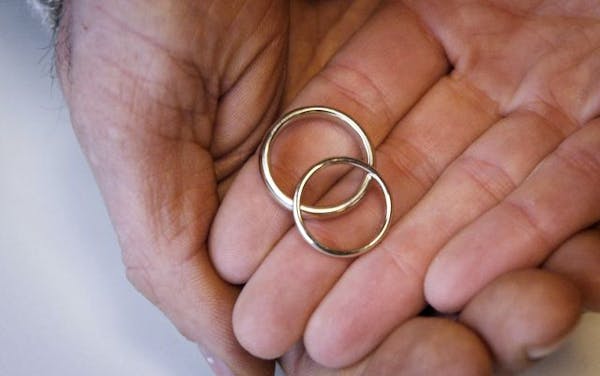On Nov. 6, Minnesota voters will decide whether marriage will be protected in our state Constitution as the union of one man and one woman. Opponents' reason for fundamentally redefining our bedrock social institution appears on yard signs that dot the metro area: "Don't limit the freedom to marry."
Now, Minnesotans are nice folks, and we don't like to think of ourselves as needlessly limiting another's freedom. The truth is, however, we "limit" marriage in a variety of ways. You can't marry your sister or your father. You can't marry a 12-year-old, or two people, or someone who's already married to someone else.
Why do we "limit" the freedom to marry this way? Is it because we harbor a dislike for sisters or 12-year-olds, or for folks who wish to express their love and commitment in groups of three?
Of course not. All social institutions have boundaries, or defining characteristics, that are integrally related to the function they perform. The vital role of marriage -- in all times and places--has been to link men to women and the children produced by their sexual union, in order to create the optimal environment for rearing the next generation.
It's misleading, then, to frame the debate over one-man/one-woman marriage in terms of "limiting" the "freedom" to marry of people in configurations that aren't consistent with the institution's mission. It's like claiming that the color blue is somehow "limited" because it's not the color purple.
The human race's two sexes -- male and female -- have much in common, but they also differ in fundamental ways. In the bearing and rearing of children, men and women complement one another physically, socially and emotionally. Women give birth to babies, and men beget them. Mothers tend to nurture, while fathers tend to encourage risk-taking. Boys and girls need -- and deserve -- both a father and a mother to model how to live.
Same-sex-marriage supporters deny the bedrock biological truth of human sexual complementarity. Society should be wholly indifferent as to whether a child has a mother and a father, they say. Any two (or three?) people will do.
The idea that men and women are interchangeable -- fungible -- is the unspoken axiom on which the argument for same-sex marriage is based. This idea has profound implications for the way we view the world, the family and human relationships. If same-sex marriage becomes law, all Americans will be required to adopt or conform to this view.
But this will be hard to engineer, because the notion of a unisex reality contradicts both our daily experience and the testimony of human history. That's why -- if same-sex marriage makes its way into law -- the strong arm of the state will be required to impose this counterintuitive vision on society.
We've already seen glimpses of what our "brave new world" may hold:
When the president of Chick-fil-A spoke out against same-sex marriage, the mayor of Boston publicly declared that there's "no place" for the company in his town. The mayors of San Francisco and Washington, D.C., echoed his sentiments.
Our public schools face growing pressure to promote unisex ideology -- often under the guise of "antibullying" education. In Massachusetts, Illinois, and Washington, D.C., Catholic Charities' public adoption and/or foster care programs have been compelled to close, because of claims of discrimination.
Scholars are discovering that questioning the new orthodoxy may end their careers. At corporations like Target and General Mills, employees who believe children need a mother and father increasingly fear that making their views clear could threaten job advancement.
Meanwhile, in California, Gov. Jerry Brown is poised to sign a law saying a child can have three legal parents.
Same-sex marriage advocates assure us that they oppose "limiting" the freedom of others. Really? It's time for them to look in the mirror.
The Minnesota marriage amendment ensures that the people of our state will retain the power to define marriage. Without it, politicians and judges will seize that power.
Currently, a lawsuit claiming that one-man/one-woman marriage is unconstitutionally discriminatory is wending its way through our state court system. Gov. Mark Dayton is a strong supporter of same-sex marriage, and in recent years some legislative leaders have given high priority to pushing bills that would redefine marriage. Depending on the outcome of the upcoming legislative elections, we could have a change in the law as soon as January 2013.
If that happens, and you believe that children need both a mother and a father, be prepared to be declared "persona non grata" in civilized society. Be prepared to live with a target on your back, proclaiming in bold letters: "Bigot."
------------------------
Katherine Kersten is a senior fellow at the Center of the American Experiment. The views expressed here are her own. She is at kakersten@gmail.com.

The little park that could … be better
Climate change looms large this election year
For this Minnesota legislator, action targeting child abuse is intensely personal


